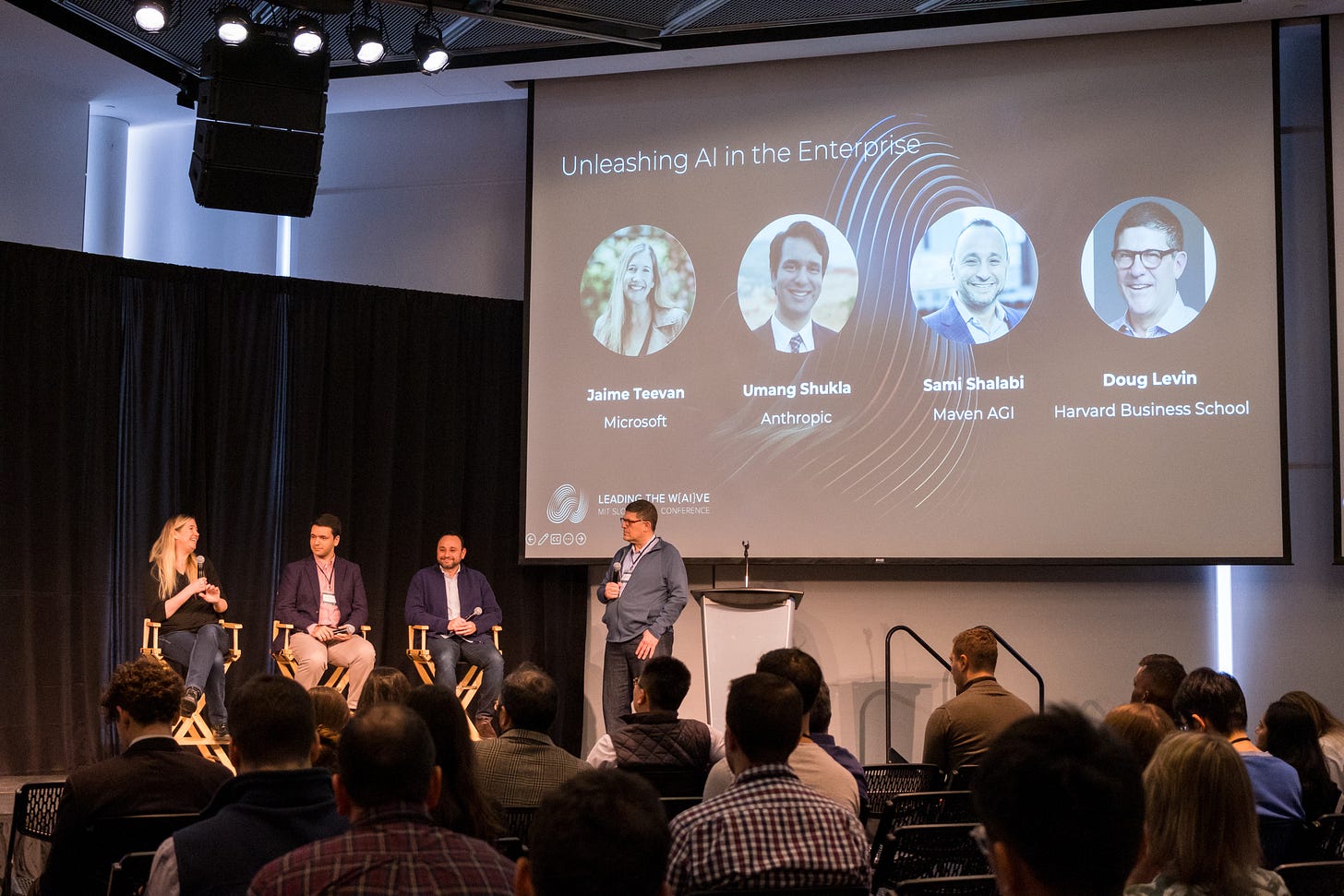The "LEADING THE W(AI)VE" Conference convened at the MIT Media Lab last Saturday, March 9, 2024, was not just a conference; it was a confluence of minds eager to decode the language of the future. Organised by the MIT Sloan AI & ML Club, speeches and panels ranged from ethics and inclusion to policy and creativity. All told the event encapsulated the multifaceted nature of AI. As a participant and attendee, one thing was clear: AI is not just about technology; it’s about shaping a future that reflects our most profound human values and aspirations.
With an estimated 400 attendees, the conference kicked off bright and early with Amy Nordrum of the MIT Technology Review and Jaime Teevan, Chief Scientist and Technical Fellow at Microsoft, where she is responsible for driving research-backed innovation in the company’s core products. They discussed, among other things, "What’s Next for AI?"
Teevan expressed a profound interest in the evolution of generative AI systems, particularly in their potential to progress beyond mere responses to prompts. She emphasized the next leap forward would be for these AIs to start posing probing questions themselves, signifying a shift towards a more interactive and anticipatory form of AI.
Emad Mostaque of Stability AI followed, delving into the transformative impact of AI across industries and highlighting the role of open innovation and open source in driving AI invocation. Manish Kumar adeptly guided this conversation, shedding light on the intriguing possibilities.
The subsequent discussion, "Innovative AI Startups: Creating Strategic Moats," brought together Andrew Hoh from LastMile AI, Jared Quincy Davis of Foundry, Antoni Rosinol of Stock AI, and MIT Sloan School Professor Don Sull. They delved into the perennially challenging subject of establishing defensibility in the AI business landscape and constructing strategic moats around their ventures. The conversation also highlighted entrepreneurial drivers for propelling AI innovations forward.
"Unleashing AI in the Enterprise" (picture above) was the panel that I moderated, peeled back the curtain on AI’s role in transforming business operations. The panelists included Jaime Teevan; Umang Shukla, who leads GTM Global Accounts at Anthropic, where he builds reliable, interpretable, and steerable AI systems for enterprises; and Sami Shalabi, co-founder and CTO at Maven AGI, a generative AI platform for customer support. Since I presided over the panel, I could not take notes, but here are some highlights from mental notes:
Companies are rapidly integrating various forms of artificial intelligence, like generative AI, into their operations at an unprecedented rate.
Enterprises embarking on AI adoption navigate a complex landscape of challenges, including ensuring data quality, overcoming expertise gaps, addressing integration hurdles, and scaling AI affordably.
AI's potential to revolutionize business comes from its ability to automate tasks, provide predictive insights, and elevate customer interactions, which drives efficiency and fosters innovation.
To maintain the integrity of AI applications, companies are instituting stringent data governance, conducting regular communications sessions and audits, and employing sophisticated data validation techniques.
Risk management in AI projects necessitates regular and robust testing protocols, ongoing surveillance, and the integration of ethical AI practices.
Collaboration with external AI vendors is commonplace, with the degree of partnership varying according to an enterprise's internal AI capabilities.
Recognizing the need to prepare their workforce for AI integration, enterprises are initiating training and upskilling initiatives, though there remains a gap in comprehensive education and support.
AI is progressively becoming part of business strategy, operational efficiency, customer service, and decision-making.
Ethical guidelines and compliance with industry regulations are also taking center stage, emphasizing fairness, transparency, accountability, and privacy.
Looking ahead, the AI industry anticipates significant impacts from emerging technologies, such as AI with infinite memory and augmented AI.
Before breaking for lunch, the "AI Research Presentations" session, featuring research stars Sang Han and Noman Bashir, offered a sneak peek into the future of AI research.
I had to leave the conference half-way through because of a broken door at home.
Still, it was clear that AI's evolving journey interweaved humans-in-the-loop – especially human creativity – and ethical considerations, promising transformative adaption and future technologies. The W(AI)ve conference was an outstanding event. Discussions extended beyond theoretical AI applications to practical strategies for overcoming enterprise challenges, ethical practices, and the vital role of training, marking a blueprint for AI's integration into a more inclusive future.




